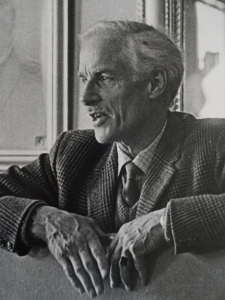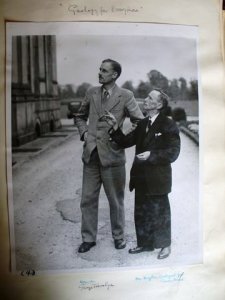At the start of this year, I began my research on the Shropshire Adult Education College after months waiting excitedly to start, combining my time between finishing off in my job of 6 years and contemplating a brand new life as a researcher. In preparation, I had been reading about the College, a short-term residential college with a rich abundance of diverse, ground-breaking and challenging courses, and its charismatic Warden for 23 years, Sir George Trevelyan.
In the cold of a January day I arrived at Attingham for the first time in my new role and fell immediately under the spell of the Hall as I entered the impressive gateway and followed the graceful sweep of the entrance road to the building itself, austere and elegant, in the distance. I imagined the sensation of being a student here, in the early days following the war, the ferment of courses, conversation and debate aimed at people from all walks of life and with all manner of interests. What was it like to learn in such a setting?
Starting in on the College archives – a series of boxes full of newspaper articles, photographs, college records and reports – an impression of Trevelyan the man begins to form.
Trevelyan shaped, crafted and imprinted his vision onto the college, with the support (most of the time! ) of a Board of Governors made up of Shropshire County Council, the University of Birmingham, the Walker Trust and Lady Berwick herself. He was one of 132 applicants for the post of Warden and was nervous and tongue-tied, by his own account, but his love of public education and his own unusual provenance as a former lecturer at Gordonstoun – the Scottish public school, an Army tutor and a craftsman and furniture maker apparently set him apart. Initially, there were places for only 30 students and the net was cast wide to attract local people from, amongst others, technical colleges and institutes, youth clubs, women’s organisations and interest groups, such as the local Archaeological and drama clubs. Courses spanned History, Sociology and Psychology – such as England in 1790, the Age of Attingham; the Human Situation and Problems of the Adolescent in Modern Society – as well as Music, the Arts and Drama and practical ‘country living’ courses such as bee keeping.
The palpable energy and commitment to the college, the drive to keep costs as low as possible, the all-embracing ethos that ‘no-one need be deterred by the feeling that he or she is not a scholar’ (Trevelyan) create a sense in me of a pioneering and important educational project. And my next step is to focus on the real stories and experiences of people who were students at the college.
So, can you or anyone you know help me with stories, artefacts, memories of the College? If so, please contact me on sharon.clancy@nationaltrust.org.uk
You will help make the College come to life!

